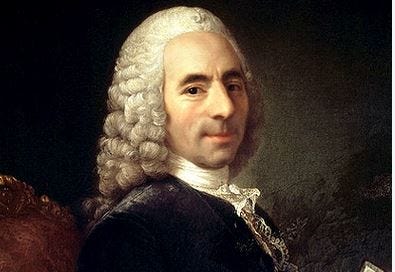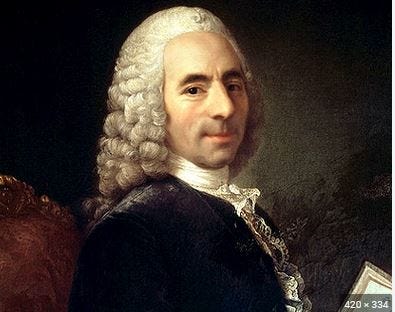Physiocrats. It is well-known in the history of economic thought that the founders of political economy, the Physiocrats and Quesnay in particular, thought that only agriculture is productive and manufacturing is “sterile”. Their use of the word “sterile”, and insistence on it, is unfortunate because the reality of what they argued is more sensible and sophisticated.
What they meant by “sterility” of manufacturing is that the price of manufactured goods decomposes into depreciation of capital, subsistence wage, “normal” return to the capitalist (which they, rather generously, assumed to be 10% per year) and even “recompense” for entrepreneurship. So why is it different from what economists believe today? In effect we use exactly the same components. But for the Physiocrats there was no surplus (on top of these four components which they saw as simple inputs) which could be taxed to provide income for the elite: the people who do not directly participate in the process of production, namely landlords, clergy and government officials.
In a certain way, it was quite sensible: one cannot tax subsistence wages, nor can he tax profit that is at a “normal” rate if he believes that driving it below that rate will result in no production being undertaken at all. However, absence of surplus in manufacturing was at odds with what was observed in France at the time. As Georges Weulersse, the author of the most detailed analysis of physiocracy (see below), explains, large fortunes—by definition made of accumulated surpluses—existed in manufacturing. Yet Physiocrats stubbornly refused to admit that, and argued that these fortunes existed only because of special protection given to individual industrialists. Manufacturing, they held, could not produce surplus on its own without state protection.
It was only in agriculture that existed a surplus that could be taxed: ground rent. For in agriculture, price decomposes into depreciation, return to capital advanced by the tenant-farmer, subsistence wages paid to the hired labor and…the rent. Rent is not an income necessary to bring forth output. It is (as the nice formula has it) price-determined, not price-determining. It is the only net income which can be taxed and used to maintain a civilized society that needs government for the protection of property and administration of justice, and clergy for the provision of spiritual sustenance.
Physiocrats, quite consistently with this view, argued in favor of policies that would raise agricultural production through longer land-leases (so that tenant farmers have incentive to invest in land improvement), freedom of movement of grain (laissez-passer) and freedom of exports. Such measures would increase both the quantity of agricultural output and the relative price of food, and therefore doubly yield a greater net product, the goal of economic activity as defined by them.
This is, in essence, the logic behind the view that only agriculture is productive, which, without looking at it more closely, seems strange to the modern ear. But thinking of it, poses the all-important question: what is net income? There is no general answer to that question. It depends on what the social structure is, and what is the goal of economic activity. Incomes that Physiocrats disregarded, i.e., wages, depreciation, interest, and entrepreneurial profit, are all parts of the gross value added as presently defined. Their and our components were not different. It is just that they were not interested in the components, like wages, that appear to us to be a valuable goal of economic activity.
SNA and online work. And indeed the same questions regarding the definition of gross value added are discussed today: how should GDP account for the use of exhaustible resources, or should it include net income from financial services and insurance? (For a nice book on GDP measurement, see Diane Coyle’s GDP: A Brief, but Affectionate History; for a tough review of the book, see Moshe Syrquin’s long essay here.) When the System of National accounts (SNA) and GDP in its more or less current version were defined, Simon Kuznets thought that transportation services should be considered an intermediate good and not included in value added. This was not accepted even if Kuznets’ logic was impeccable: if you use bus, metro, or your own car to go to work, depreciation of the car and the expense of gas etc. have to be deducted from your wage. Travelling to work is a means, not a goal. Kuznets’ argument reappears rather unexpectedly today with the “explosion” of online work during and after the pandemic. Online work reduces the travel cost but since we have decided that transportation to and from workplace should be counted as value added, less of commuting traffic lowers GDP. We thus have a paradoxical situation that what is clearly an improvement in the welfare of workers is counted as a reduction of GDP.
Output of goods only. There was a very important difference between the System of National Accounts and the System of Material Balances used in centrally-planned economies. The difference was due to what was considered to be the goal of economic activity. SMB excludes all activities that result in non-material output: government administration, education and health services. Gross output in centrally-planned economies was thus systematically lower than when expressed in the SNA. The difference was estimated at between 10 and 15 percent, and in some cases even 20 percent.
On the other hand, given that productivity growth is slower in education and health than in the production of material goods, underestimation of gross output in socialist countries was combined with an overestimation of the rate of growth. We thus had, judged from the standpoint of SNA, two opposite biases in centrally-planned economies: lower level of output, but its higher rate of growth.
Surplus value. The SMB claimed to have been based on Marx’s view of productive labor, but this is not obvious because we do not know what exactly was seen by Marx to be the goal of economic activity in socialism. Marx believed that “productivity” (and thus the goal) is a historic concept, defined from a systemic point of view. In a capitalist system, productive is the worker who produces surplus value for the capitalist. This is the origin of Marx’s famous example of the opera singer who is a productive worker if he is hired by a capitalist, but not when he works for himself. Productivity of labor is not, according to Marx, deducted from labor being embodied in goods as opposed to services (as held by the SMB) but from labor’s contribution to what is the goal of economic activity in a given system. Under capitalism, it is profit. So if the opera singer generates profit for the impresario who hired him, he is a productive worker. Similarly, if the goal was to provide net income for the elite as Physiocrats thought, and if the only source from which this can be extracted is agriculture, the correctly defined net product is indeed as they defined it.
What we call value added or useful output in one system is not necessary the same as what we call useful output in the other. It depends on what the ruling ideology tells us is the reason why we engage in economic activity at all.
---------------——-
Some suggested readings on Physiocrats:
Georges Weulersse, Le movement physiocratique en France, de 1750 à 1770. Paris: Maison des Sciences de Homme, Editions Mouton, 1910. Available at http://archive.org/details/lemouvementphysi01weuluoft. (A monumental two-volume discussion of the intellectual milieu before the Revolution within which the movement developed, its rise and fall, and its ideology.)
Gianni Vaggi, The Economics of François Quesnay, Durham, N.C : Duke University Press, 1987. (Excellent and sophisticated analysis of the physiocracy enlightened by Sraffianism.
Ronald L. Meek, Economics of Physiocracy, Routledge, 1962. (A standard reference text with translation of selected writings, including Le tableaux économique and brilliant introduction by the editor),
Marguerite Kuczynski and Ronald L. Meek (edited with new material, translations and notes), Quesnay's "Tableau économique”, London: MacMillan for the Royal Economic Society and the American Economic Association, 1972. (Le Tableau in all its grandeur and complexity with the commentary.)




Just came to mind - who said that net profit in manufacturing doesn't include rent of some shape or form? In fact, under monopolistic competition framework, it kind of is. It wouldn't exist unless there was, well, monopolistic rent. This marries phisiocrats with neoclassical economic theory nicely.
In Marx, the human being -- and therefore all possible forms of human society -- is always a natural being. That means humans must always be treated as a species like any other from the biological point of view, but particularly human in its social point of view. It is literally the human species (homo sapiens).
Labor is thus treated as a specifically human trait. A human uses its labor power in order to transform natural (objective) matter into something. This something must always be something humanly useful, which makes it a social phenomenon opposite to just physical labor, which any species and, indeed, anything that generates any amount of joules (which, in physics, is called "work", not labor).
With labor applied, a human transforms nature into something useful for itself as a species. (remember, in Biology, everything is at a species level; there is no such thing as an individual that acts completely for itself). The key word here is "transforms": humans do not create nature, but only transforms it into something else. Humans do not create anything in the strict, STEM meaning of the word; they do not literally create space-time and particles and energy, but only transform, at a loss, those basic elements of Planet Earth that were already there since before humanity even existed.
Applying this philosophic concept to societal formations and History was an easy task for Marx, who had a Masters and a Ph.D. in Logic. Well, since humans do not really create anything, then what we consider "growth", "surplus" or "wealth" must necessarily be a social concept, a subjective concept from the human point of view. Since humans are only a single species, it is patent it act as a species, which means it can only exist in, let alone prosper, in very specific and objective natural conditions -- its habitat, in biologic terms. "Wealth", "growth" etc. etc. must thus be the state where the homo sapiens expand its habitat in all meanings of the term.
So, how does that apply to capitalism specifically? In book I of Das Kapital, Marx talks about simple and amplified reproduction. Simple reproduction is the intuitive process where one system consumes everything it receives in order to reproduce itself identically; amplified reproduction is when it reproduces itself at a larger scale than before. How do we consolidate amplified reproduction with the obvious and undeniable fact humans do not create anything?
Here the dialectical method shows its elegance and scientific precision: Marx demonstrated logically (which is a proof beyond the scientific) that, objectively, amplified reproduction is simple reproduction, but simple reproduction <B>beyond a certain point</B>. A capitalist, before he starts to profit, must first maintain what he had in the state before. Capitalism must first maintain everything it already had before amplifying what it already had. Before valorizing, capital must revalorize. One cannot dream about earning his millionth USD before earning his 999,999th USD.
Either way, the only tool humans have to do both processes (which are actually just one process) is through labor, because labor is the only mediation possible between humans (homo sapiens) and the natural objective world (nature). After all the homo sapiens is still only a species.
From the macro case we can easily infer the micro case. The difference between value and surplus value is the simple extension of labor beyond a certain point (the point before being the previous state); the capitalist may simply extend the journey of the worker or make it more intense (transform more matter and energy from the natural objective world per unit of time) or both. The principle is exactly the same.